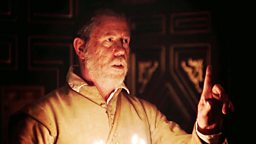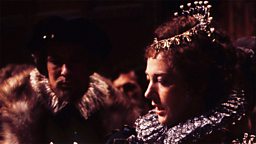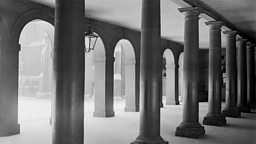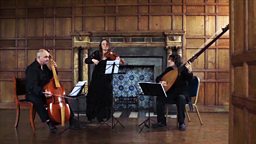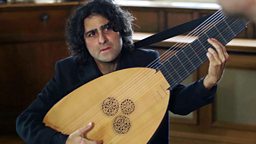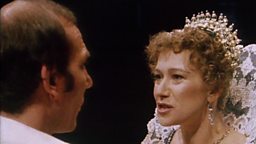The Duchess of Malfi: John Webster's Life
By Dr Derek Dunne
John Webster was born in the suggestively named parish of St Sepulchre, Newgate in London between 1578 and 1580.
His father was a coachmaker, and a prominent member of the Guild of Merchant Taylors. This family background perhaps explains Henry Fitzgeffrey's barbed description of "crabbed Websterio, the playwright-cartwright in the satirical poem Notes from Blackfriars.

Webster's education is unclear, until an entry in the records of the Middle Temple notes the admission of "Magister Johannes Webster" in 1598.
The legal culture of the Inns of Court had a formative influence on the young Webster, as can be seen in the vivid trial scenes of The Devil's Law-Case, and more importantly, The White Devil.
The literary culture at Middle Temple brought him into contact with other important figures, including John Marston, Sir Thomas Overbury, and John Ford.
Drama was an important part of life at the Inns, and Middle Temple Hall is known to have staged an early performance of Shakespeare's Twelfth Night in 1602.
In 1606, we find a record of John Webster marrying the seventeen-year-old Sara Peniall by special license in Islington, at that time a village outside London.
One reason for the obscure location is suggested by the fact that two months later the couple’s first child, John, was born. The Websters had at least three more children, but little more is known about the author’s family life.
We can say with certainty that Webster's career as a dramatist had begun by 1602, when Philip Henslowe makes a payment to Webster, along with Anthony Munday, Michael Drayton and Thomas Middleton for a play called Caesar’s Fall (now lost).
Different fates
Indeed, Webster appears as a collaborator more often than as sole author. He partnered with Thomas Dekker for two fashionable city comedies, Westward Ho (1604) and Northward Ho (1607), and adapted John Marston’s The Malcontent for the King's Men in 1604.
Webster's final years are as obscure as his first
Webster's two most famous tragedies appear to have had very different fates on their first performance.
Webster tells us himself in the preface to The White Devil that it was "acted in so dull a time of winter, presented in so open and black a theatre" that it wanted "a full and understanding auditory".
The Duchess of Malfi fared better when performed by Shakespeare's company "privately at the Blackfriars, and publicly at the Globe".
The composition of the play seems to have been interrupted by the tragic death of King James’ eldest son Henry, Prince of Wales, at the age of eighteen.
Critics have noted the elegiac tone of certain passages, which share similarities with a poem composed by Webster on the occasion of the Prince’s death in 1612.
Webster continued to write well into the 1620s, collaborating with dramatists such as Rowley, Dekker and Ford. He had a hand in over thirty of Sir Thomas Overbury's Characters, including An Excellent Actor, where we are told:
"Sit in a full theatre, and you will think you see so many lines drawn from the circumference of so many ears, whiles the actor is the centre."
Webster's final years are as obscure as his first, and we cannot say with certainty what year he died in, nor where he is buried.
What we do know speaks of a man with a wide network of professional friends, who had an intimate knowledge of some of the most important institutions of early modern London.
These include not only the Inns of Court, and the guild of his father, but the early modern theatre itself.
This essay was commissioned by The Globe for The Duchess of Malfi programme

BBC Arts at the Globe
-

The Duchess of Malfi
Andrew Marr presents this production of John Webster's bloody revenge tragedy The Duchess of Malfi (1614) performed in a perfect recreation of an early Jacobean theatre
-

The Mysterious Mr Webster
Professor James Shapiro goes in search of the mysterious man behind The Duchess of Malfi, the son of a coachmaker who ended up rivalling Shakespeare
-

Gemma Arterton as The Duchess of Malfi
Preview Gemma Arterton in the title role of the Globe Theatre's production
More from BBC Arts
-

Picasso’s ex-factor
Who are the six women who shaped his life and work?
-

Quiz: Picasso or pixel?
Can you separate the AI fakes from genuine paintings by Pablo Picasso?
-
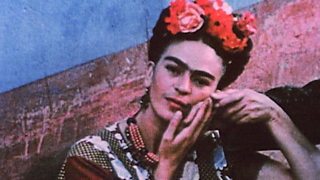
Frida: Fiery, fierce and passionate
The extraordinary life of Mexican artist Frida Kahlo, in her own words
-

Proms 2023: The best bits
From Yuja Wang to Northern Soul, handpicked stand-out moments from this year's Proms

